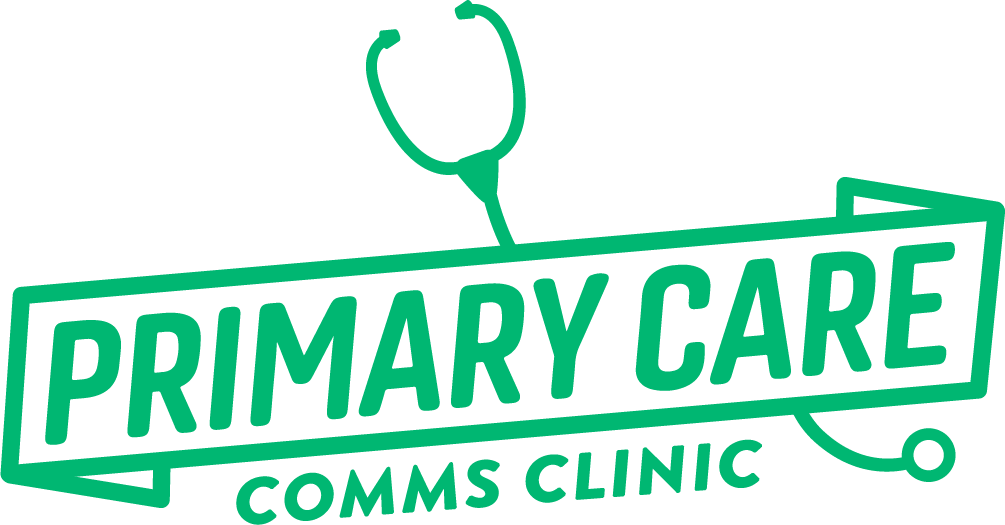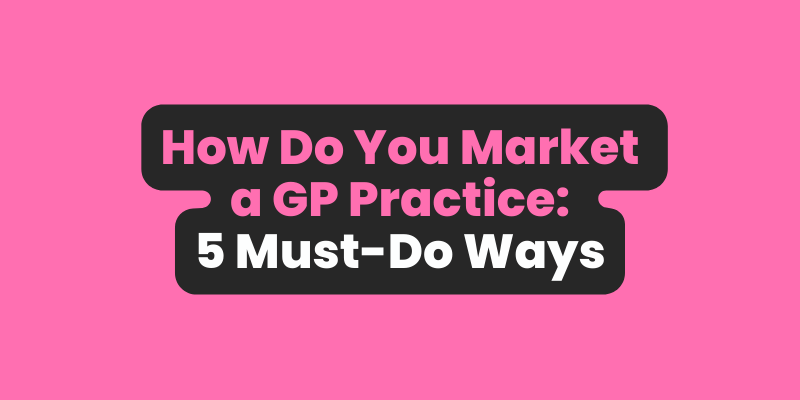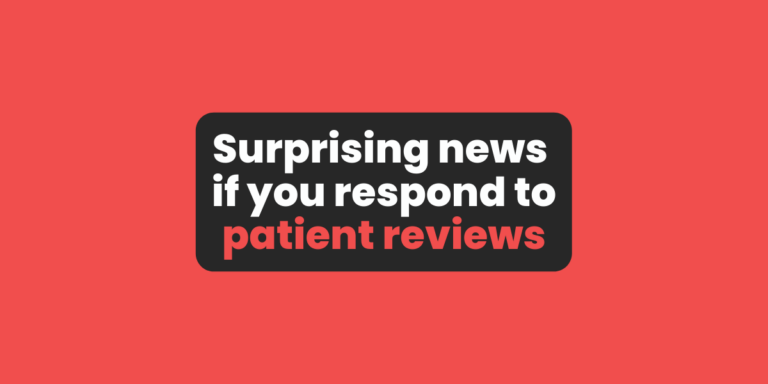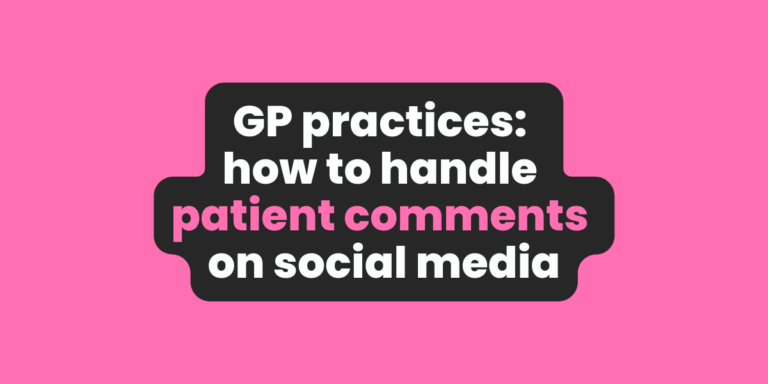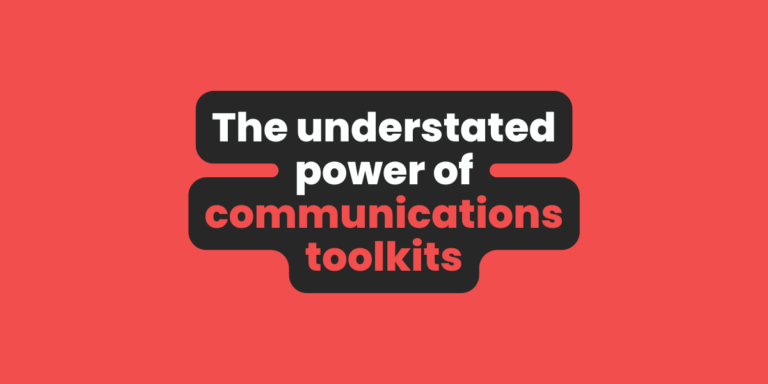Whether it’s a dedicated GP partner duo running a busy NHS GP practice or a bustling inner-city private medical clinic, every client that’s ever knocked on Primary Care Comms Clinic’s door has always had one request in common deep down; “can you help us show the heart and soul of our service and help us attract new patients?”. And we’ve said yes.
Through our communications toolkits, we’ve given GP practices the tools, templates and resources to create their own marketing and communications in-house splendidly. And we’ve also shown practices that social media is more than just talking about a bunch of awareness days. (Be sure to take a look at our article on NHS awareness days though, if you’re interested).
So, if you’re a doctor or practice manager searching the internet for answers and have ended up here, welcome, friend! Let’s dive into the basics of what you need to know about marketing your medical practice.
Why Medical Practice Marketing Matters in 2024
Now, more than ever, marketing our medical practices is not just a nice-to-have; it’s absolutely vital for bringing patients through your doors.
With more than a billion pieces of content being produced daily on social media and a wealth of health information at their fingertips, our patients are becoming discerning customers with higher expectations than ever.
They don’t just want healthcare; they want healthcare that feels personalised, accessible, and trustworthy. This is why getting your marketing and communications right can really set you apart in this increasingly competitive landscape.
How to Grow a Private Medical Practice
Speaking from personal experience, growing a private medical practice means much more than offering top-notch consultations at a time and place to suit your patients. It’s about creating a relationship with your community, both online and offline.
I’ve found that when practices can share their expertise through short-form videos, create jargon-free checklists and blog posts, and participate in local events, it brings them closer to patients and builds that superpower most doctors and clinicians forget they already have: trust.
And, when you consider all the reasons why patients want to see a private GP over an NHS one these days, one little perk comes up repeatedly and is mentioned in many of the patient reviews we help answer. The simple follow-up phone call to check in with a patient after their appointment, whether it’s a week or two weeks later. Little things like this go a long way.
Ways to Market an NHS GP Practice
Marketing an NHS GP practice comes with its own set of challenges and rules, which differ wildly depending on which part of the country you are in, but it’s equally rewarding when you get it right.
I find most NHS GP practices are already pretty au fait when it comes to strengthening their place and connecting with the community. Promoting health education and ensuring their practice stands as a beacon of support and care to their patients is where most practices no longer have the head space to do this alone. (And we help them out).
By using comms and marketing to show patients just how much practice teams are doing to deliver timely access with wider teams of health professionals and digital ways to contact the practice rather than the dreaded 8am rush, our clients have faired pretty well. Loyal, mostly positive patient experiences in a digital era with a national shortage of clinicians should be hugely commended!
How to Develop a Healthcare Marketing Strategy for Your GP Practice
This stuff doesn’t just happen on its own.
Crafting a marketing strategy is a journey that requires time and a few heads rather than just one.
It starts with taking a step back to really understand the patients you serve and what makes your practice unique.

Is it your cutting-edge technology, compassionate care, or convenient early-morning clinics? Or is it your clunk-free appointment booking system, outstanding CQC rating or doctors with specialist skills that your next-door practice doesn’t have? Note down the lot.
From there, setting goals and planning marketing campaigns that drive traffic to your website, boost the use of your digital consultation tools and bring new potential patients in becomes so much clearer. And we’re not talking War and Peace here! A well-planned strategy can actually be just one page and act as your roadmap in the bustling world of healthcare and digital marketing.
What to Include in a GP Practice Marketing Strategy
Brand identity
This is your story. Who are you? What do you believe in? What makes you different, and why should this matter to your patients? How do you help patients, and who makes your service run each day?
Your brand is so much more than your logo; it’s what you stand for, it’s what potential patients say about you when they think you’re not looking. Your brand should be everywhere from your website to your waiting room walls.
Market analysis
Regardless of whether you’re NHS or private, knowing your target audience and your patient population inside-out is a must for tailoring your services to meet their needs and communicate effectively.
If you’re in a private clinic, what types of issues do patients bring to you the most that you could become known as the local specialists for? We had one private practice where the lead GP was a women’s health and menopause specialist, so her practice quickly became known locally as the place to go for perimenopause advice through word-of-mouth referrals. If you’re an NHS GP practice, do you have a high number of patients living with long-term conditions?
Do you need to invest in more virtual support for these patients and communications aimed specifically at them to help manage their conditions at home and stay well and out of hospital?
Promotional Tactics
From accessible GP websites and traditional flyers to text message campaigns and social media ads, how we get our message out there makes all the difference.
We always talk about getting the biggest bang for your buck at Primary Care Comms Clinic, which basically means looking at all the communication and promotional tactics you have at your disposal and choosing the 3 or 4 that will reach the most patients.
Focus on these and do them well, and you may not even need to do any further marketing. And if you do, you’ll be at least introducing new techniques on top of the solid foundations you built first. There’s more on these further on in this post.
Budget
Money matters, and we’ve got a cost of living crisis. Allocating enough of your budget towards good-quality marketing and communications is a must if you want to get the best return on investment.
That doesn’t mean going for the cheapest option (you buy cheap, you buy twice, as my mum always says) or the most expensive one (‘ow much?!). It’s about asking how this will impact me, my staff, and my patients. How much will it cost you and your team both physically, operationally and mentally if you don’t get support?
A typical GP practice website will set you back anything between £500 and £2,500, depending on where you’re located and how many bells and whistles you want on it.
A professional communications service for a few hours of support to help you create content and schedule social media posts will cost between £400 and £500 per month.
Get at least three quotes and chat to people about their credentials before signing any SLAs.
Measurement and Review
This is how we learn and grow. Understanding what works and what doesn’t is crucial. I talk to so many practice owners who do the same thing repeatedly and wonder why things don’t get better. It’s often just because they’ve had no time to look up from the coalface or speak to marketing professionals doing this for a living.
The marketing and social media world changes so fast, often each month. And when you add in the changing face of primary care; that’s a whole lotta change to keep on top of yourselves. (So again, get help!)
How Long Does it Take to Market a GP Practice Effectively?
Okay, so the million-pound question: “How long until I can see results, Kara?” I won’t sugar-coat this, effective marketing takes TTR (time, testing and refining). It’s less like a sprint and more like a marathon; a steady, persistent effort with two to four tactics done consistently well yields the best results.
From researching your patients’ needs to rolling out your marketing plans and measuring their success, it’s a process that requires patience. Generally, you should start seeing the fruits of your labour within 3-6 months, depending on your strategies and what’s happening on the ground in your surgery too. The key is consistency. Like with a good workout, you can’t expect a six-pack after one session at the gym, right?
Magic happens when we commit to our goals and work diligently towards them, without being disheartened by initial slow progress, just as you would advise your patients. Little by little, your practice’s online visibility improves, more potential patients begin to engage with your social media posts, and you start to see more new faces in your clinic. So, while marketing results don’t show overnight, the end result is absolutely worth the effort.
GP Practice Marketing Timescales
Here’s a rough blueprint of a marketing timescale for a GP practice looking to improve their patient marketing and communications to give you an understanding of how things can unfold:
- Weeks 1-4: This is your research and planning phase. Understand your different groups of patients, map out which 2 to 4 strategies you’re going to concentrate on first, allocate your budget, and set your goals.
- Weeks 4-8: Begin executing your strategies. Launch your website, start your social media presence, send out that first newsletter.
- Weeks 8-12: This period is for nurturing your marketing tactics and observing initial responses. Keep that content flowing and engage with your followers, measuring everything as you go.
- Month 3 onwards: Around this time, it’s time to begin evaluating. Use your analytic tools to review progress, see what’s working, and where you might need to do a Ross Gellar and “pivot!”
Remember, this is just a rough guide. Your timescales may vary based on the specifics of your practice, the marketing strategies you employ, and the market environment you’re operating in.
Throughout all your efforts, maintain your authenticity, show up consistently for your patients, and celebrate your tiny victories along the way. Trust me, it’s not just about the destination; the journey of growing your practice is equally rewarding, we see it time and time again.
Choosing Effective Marketing Over Sparkly Marketing
In a world full of flashy ads, vanity videos and braggy social media posts, what truly resonates with potential patients is authenticity.
Research has shown time and time again that patients appreciate genuine care and communication over grandiose marketing stunts or perfectly-polished communications.

So, when we work with practices on which marketing ideas to go for, we concentrate on marketing efforts that genuinely reflect your values and connect with your patients on a personal level because nothing’s more personal than health!
Best GP practice marketing ideas (the must-dos for most practices)
1. Create and Maintain a Mobile-Friendly Website
Regardless of whether you’re a private clinic or NHS surgery, over 95 per cent of patients are visiting your website using a mobile phone. Your website is often the first point of contact for potential patients, so make that first impression always count.
Make sure that when you’re designing and writing the content for it, it’s mobile-friendly first. That means plenty of white space and headings to help people skim read and only add information that patients need to know rather than what’s nice to know.
And always concentrate on a seamless navigation and menu. Consider the actions patients are coming to your site to do, such as booking an appointment, ordering a repeat prescription, or getting a sick (fit) note, for example. Use the same words they do; don’t try to be clever!
2. Optimise Your Website with Healthcare SEO
If your website is designed and set out properly using the keywords and terms that patients use to find and use your services, it will be well on its way to being optimised and more accessible for the search engines to find and show you in the search results to loads of local patients.
We always recommend claiming your Google My Business listing, even if you choose to do nothing with it straight away. It’s so important for local SEO, answering patient reviews (yes, we know they’re unverified, but your answers are what matters!) and keeping your opening times up to date, especially during bank holidays.
But if you’re a private practice in particular, getting to know about SEO (search engine optimisation) has been game-changing for many of our clients. It’s all about ensuring your practice pops up when someone in your area searches for services like yours.
SEO isn’t a magic bullet, and it doesn’t happen overnight. However, if you find a good SEO specialist with healthcare experience, the leads and enquiries will slowly and steadily roll in through content marketing, backlinks and well-optimised pages. (And if all that sounds like gobbledegook, that’s normal. We know just the people you need to talk to and can guide you through it!)
3. Market Your Practice Regularly with a Patient Newsletter
Aren’t newsletters a bit old hat you say? Never! In our experience, patient newsletters have had a massive revival in recent years as people slowly start to reduce the amount of time they spend on social media.
People still want to hear local news that affects them. If it’s health information they’re interested in, they’d much rather sign up for a helpful newsletter from people they trust than try and find it amongst the Gary’s, Donna’s and Frank’s arguing about dog poo on Facebook.
We have a lovely primary care network in the north west who we write a monthly community bulletin for. It’s packed with health tips, practice updates, and personal stories that keep their patients engaged and informed. And because we share it as a web page rather than a PDF, we can track how many people read it. It can also be translated into other languages and made more accessible for those who need screen readers.
4. Super Social Media Marketing Ideas for Your Practice
Social media is a good way to share instant updates, celebrate your team, and demystify healthcare for your followers, but only if patients actually see your posts in the first place.
With dwindling organic reach, social media is getting harder and harder without ‘paying to play’, i.e. advertising. Less than 3 per cent of your followers see your Facebook posts alone, so you can be forgiven for wondering whether it’s all worth it.
For some practices, we are quite adamant it’s not the best use of their time and we’ll be very honest about that, but for private clinics and practices with a large following already on social media, used strategically with paid ads and more light-hearted human content, social media can and does make a difference. Our comms toolkit is packed with daily engagement ideas and more than just NHS awareness days you can try out too.
5. Targeted Email Marketing or Text Message Campaigns
Email and text messages are not just for appointment reminders or vaccination invites. They can be personal, direct and effective for reaching targeted groups of patients about all manners of things. Just some of my favourite campaigns so far this year have included:
- Patients in a rural community who worked from home were invited to join a walking group every Thursday run by social prescribers and the team’s mental health practitioner.
- Women aged between 40 and 50 were invited to a well-woman clinic with speakers and clinicians who specialised in perimenopause and lifestyle medicine. They now receive quarterly newsletters through Mailchimp and patients say it’s a great resource!
- An online evening webinar for worried parents about the measles outbreak by the partners with advice on what to look for and where to get help 24/7.
What Support Is There for Marketing GP Practices?
Thankfully, you don’t have to do this alone. From the Campaign Resource Centre by gov. uk and free online Google courses showcasing best practices to tools designed specifically for medical practices like our very own GP Comms Toolkit or content writing service, help is out there.
These have all been designed to guide you through the confusing parts and help you amplify your message.
Marketing your GP Practice – Next Steps
If you take anything from our experience, let it be this: the core of effective medical practice marketing is not about being the flashiest or loudest. It’s about being real, being available, and showing that you care.
Let’s put your practice out there in a way that truly reflects the amazing work you do every day and attracts new patients while we’re at it. Here’s to making a genuine difference in how your practice shines in this digital age!
Author: Kara Skehan, managing director at Primary Care Comms Clinic
